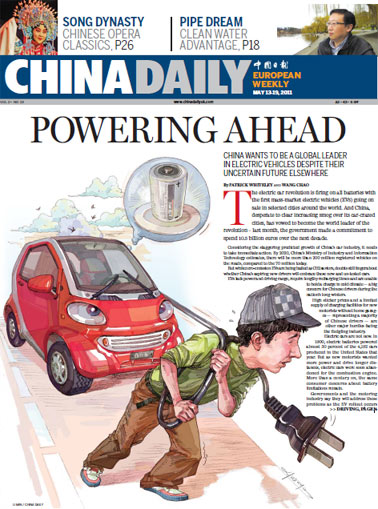Editorials
Normal military exchanges
Updated: 2011-05-17 07:57
(China Daily)
Compared to the robust Sino-US trade ties and the frequent exchanges at official and people-to-people level, Sino-US military exchanges have remained dormant in recent years. But thanks to the efforts of both sides, Beijing and Washington are making headway in fixing this weak link in their bilateral relations.
A group of high-ranking Chinese military officers, led by Chief of the General Staff of the People's Liberation Army (PLA) Chen Bingde, embarked on a week-long visit to the United States on Sunday.
At the invitation of his US counterpart Admiral Mike Mullen, Chen and his entourage, including prominent figures from different Chinese military sections, will visit US military facilities that have not been opened to visiting military leaders for years. This arrangement alone signals deepened mutual trust between the two militaries.
| ||||
Following the successful visit of US Secretary of Defense Robert Gates to China in January, Chen's ongoing tour in the US, the first in seven years by a PLA chief of the general staff, marks an important step in normalizing Sino-US military-to-military exchanges.
China expects to develop military relations with the US. This includes deepening strategic mutual trust and conducting reciprocal beneficial cooperation. To this end, the two militaries should respect each other's core interests and accommodate each other's major concerns.
As both countries are important players in world and regional platforms, their militaries shoulder common responsibilities in safeguarding global and regional peace and stability. The two sides also have a great potential for cooperating in non-traditional fields including anti-terrorism and peace keeping.
Strengthened military ties between Beijing and Washington will be a blessing to world peace and security. Stable and growing cooperation between the two militaries will contribute to global efforts addressing world security challenges.
But despite all the good aspects, Sino-US militaries ties still face three major obstacles: US arms sales to Taiwan, frequent reconnaissance by US naval ships and aircraft in the waters and airspace of China's exclusive economic zones, and the restrictions imposed by some US domestic laws on exchanges and technical cooperation between the two armed forces.
Bilateral military exchanges experienced a major setback after the US government gave a green light to a multi-billion arms sales package to Taiwan, an inalienable part of China, in January 2010.
The two armed forces should start to address these major obstacles between them and gradually reduce the gap on these issues if they intend to build stable and healthy relations and avoid ups and downs in the future.
(China Daily 05/17/2011 page8)
E-paper

Green works
Wuxi becomes 'test case' for facing country's environmental challenges
The global rise of Chinese brands
China-EU trade on solid ground
ZTE banks on innovation
Specials

The song dynasty
There are MORE THAN 300 types of Chinese operas but two POPULAR varieties are major standouts

Cut above the rest
One of the world's oldest surgeons has performed more than 14,000 operations

From the ground up
Architect of Guangzhou Opera House has many projects under way, including 2012 Olympics.




